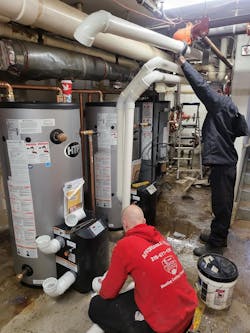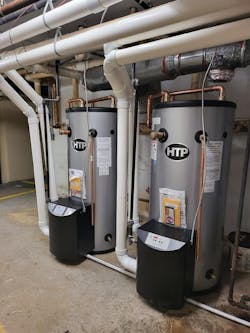That’s precisely the issue a Philadelphia-area hotelier experienced when the water heating system for an 88-room building failed just a few days before Christmas. Plumbing contractors are used to emergency service calls, but this situation—a snowstorm brewing, guests arriving, holidays on the immediate horizon—needed swift attention.
Workers from Affordable Fixes Heating Cooling Plumbing rose to the challenge and installed two HTP Phoenix 119 gallon, 199K BTU high efficiency gas water heaters. The project required the removal of four water heaters that were leaking and causing carbon monoxide development in the hotel.
“There are always challenges but replacing four and putting in two meant we had to put in a new exhaust, re-pipe the system, and re-do the electric units,’’ said Val Savkin, owner of Affordable Fixes Heating Cooling Plumbing. “It was supposed to be a one-day job. It took three, which was very efficient given the scope of the project.”
Aging System
“This was an emergency project,’’ Savkin said. “The water heaters that had been in place had deteriorated. They couldn’t be repaired any longer. It was just wear and tear, they were outdated. Just two days before Christmas we were out there in the snow getting the project finalized.”
Savkin considered alternatives before selecting the HTP Phoenix units. “These HTP units were new to us, but we wanted a high efficiency, fast recovery water heater. If we had used another system, we would have to put in at least three units,’’ Savkin said. “We saved the customer about $12,000 by selecting this system.”
The scope of the project was elaborate. Savkin sent five workers to the site to expedite the repair, including four plumbers and a scrapper to remove debris. The first step included the disassembly and removal of the existing units.
The second phase was just as challenging. Because the new system required fewer heating units, all the electrical wiring needed to be re-established along with a new exhaust and gas line.
HTP National Training Manager John Monaghan supported the quick work by determining the heat calculation for the building and recommending two Phoenix 119-gallon tanks. “That not only saved the building owner a lot of money, but it also allowed us make the installation a little bit quicker.”
The challenging part of the installation centered on getting the units in place in the hotel’s basement. “It was a very tight fit. We were fortunate to have an elevator handy,’’ Savkin said. “We had to disassemble the new units, put them in a box, put them in the elevator and then re-assemble them. If there had not been an elevator, we would’ve gone old school and roped them down.”
Efficiency and Durability
“We didn’t know much about them, but we recently had training with them and I really liked their efficiency,’’ said Savkin, who has been in business in the Philadelphia area for more than three decades. “They were a great fit with a nice integrated control and easy to replace.”
The HTP Phoenix has a 96 thermal efficiency rating, which means that 96 cents of every dollar are used toward heating, compared to a standard efficiency unit, which can have a 60 percent efficiency rating. The modulating burner operates at a 5:1 turndown ratio, which provides high system efficiency even during low load conditions.
The HTP Phoenix also includes a 316L stainless steel tank to resist corrosion. It is supported by a 7-year residential warranty and a 3-year commercial warranty, with a 5-year commercial warranty available.
“Most times you’ll get 8-12 years out of units, but like anything else it depends how much you take care of it,’’ Savkin said. “I could see these lasting 12-20 years. It’s all about the maintenance of the equipment, but it’s important to look at the water quality, too. The hardness and chemicals of the water has a lot to do with the longevity of the system.”
Crisis Averted
Savkin, and all other plumbers, are used to urgent calls requesting service. No customer likes to be without heat or hot water for any duration. Especially at the height of the holidays.
“When we first looked at this project, we gave the owner a price and he didn’t get back to us right away,’’ Savkin said. “Then he called back and said he needed to have it done immediately. It’s an occupied hotel, and we are right around the corner. With the snow, the holidays and people traveling, this could have been a bad situation for him. We were glad to help him out and fix it quickly.”
Thomas Renner writes on building, construction, engineering and other trade industry topics for publications throughout the United States.


